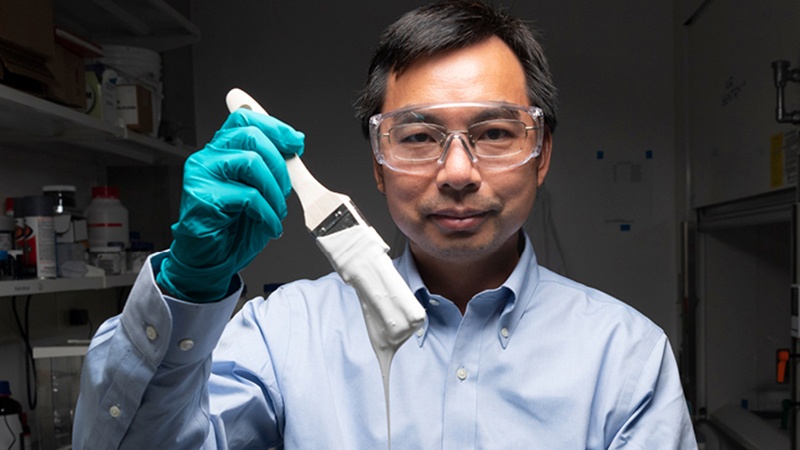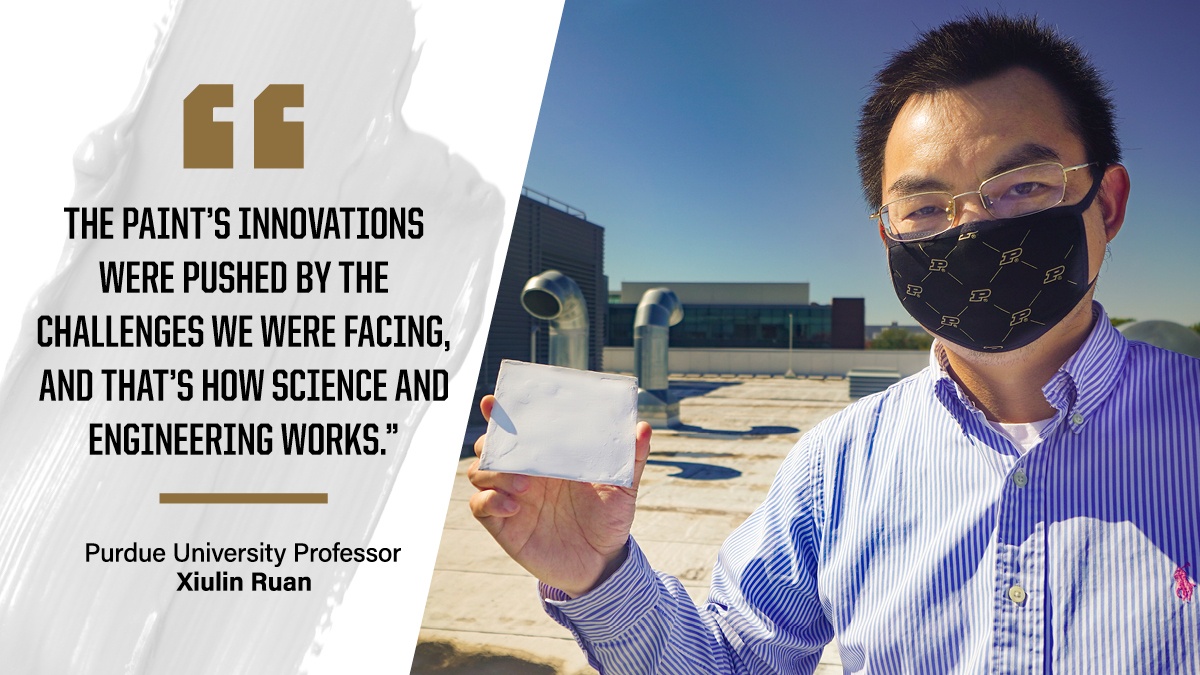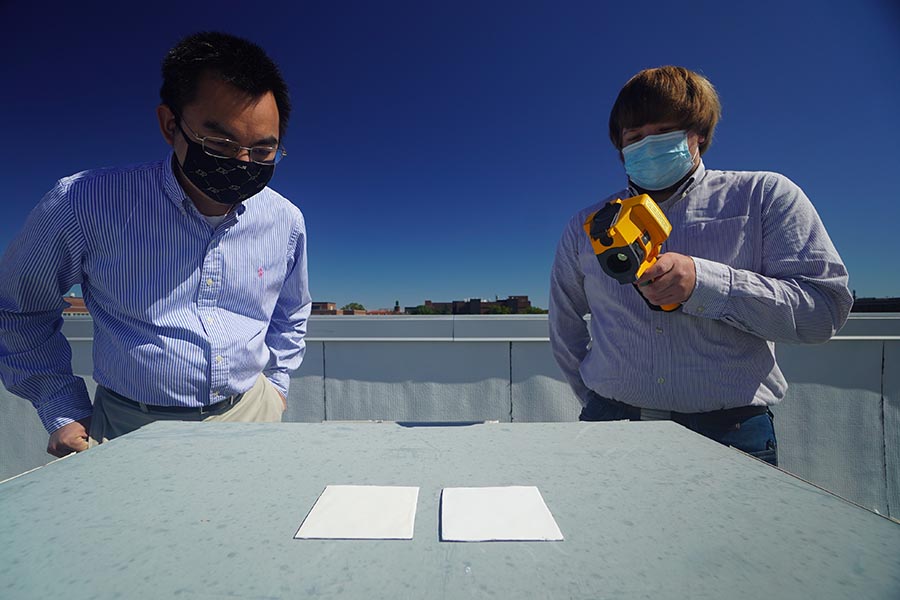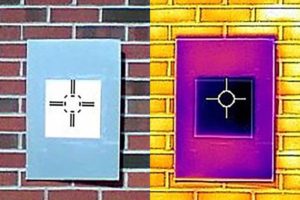Researchers have developed a new ultra-white paint that reflects 98.1 percent of sunlight and can keep surfaces cooler
A new coat of paint is an easy way to freshen up your home’s curb appeal. Soon, it may also help keep your house cool.
A new paint, which may become available for purchase in a couple of years, could help combat global warming and reduce our reliance on air conditioning.
In facts, researchers at Purdue University have developed a new ultra-white paint that reflects 98.1 percent of sunlight and can keep surfaces up to 19 degrees Fahrenheit cooler than their ambient surroundings.
The new ultra-white paint, which the researchers say is the coolest on record, reflects nearly all of the sun’s rays and sends infrared heat away from the surface, providing an average cooling power of 113 watts per square meter. If painted onto the roof of a 1,000-square-foot home, that translates to a cooling power of 10 kilowatts, which is more powerful than most residential central air conditioners.

The paint is a marked improvement from current heat-rejecting paints on the market: when struck by the sun’s rays, surfaces covered in today’s available white paints get warmer, not cooler. At best, these heat-combatting paints can reflect 80 to 90 percent of sunlight.
“Our paint only absorbs 1.9 percent of the sunlight, whereas commercial paint absorbs 10 to 20 percent of sunlight,” says Xiulin Ruan, a Purdue mechanical engineering professor and one of the recently published study’s co-authors.
What the tests say
In tests conducted during sunny, midday hours on the roof of a campus building in West Lafayette, Indiana, the paint kept outdoor surfaces 8 degrees cooler than the ambient surrounding temperatures. At night, the paint kept surfaces 19 degrees cooler than their surroundings.
“Our paint can lose heat by its own emission—it emits heat to deep space,” Ruan says. “With such little absorption from the sun, our paint loses more heat than it absorbs. This is really exciting for us. Under the sun, it cools below the ambient temperature and that’s hard to achieve.”

The paint may replace air conditioning
Heat-rejecting white paints on the market are typically made with titanium dioxide, which reflects certain wavelengths of sunlight—mainly, the visible light and near-infrared wavelengths—but absorbs the sun’s ultraviolet rays, causing the surface to heat up.
These existing paints are better than nothing, but the researchers wanted to experiment with materials that could reflect, rather than absorb, the sun’s UV rays
Researchers also took two novel steps to enhance the paint’s ability to reflect light and emit heat: They used a high concentration of barium sulfate particles—60 percent compared to the typical 10 percent in current paints—and they incorporated particles of varying sizes.

The benefits of the ultra-white paint
The potential benefits of the ultra-white paint are two-fold. By keeping surfaces cool and reducing the use of air conditioners, which are typically powered by electricity, the paint may help decrease the burning of fossil fuels. What’s more, air conditioners typically work by removing heat from indoor spaces and pushing it outdoors, a method known as convection. This heat transfer, along with other causes, can contribute to the urban heat island effect, a phenomenon that occurs when cities become hotter than the surrounding areas, thus requiring even more air conditioning. The ultra-white paint, on the other hand, uses radiation to transfer heat, sending out types of electromagnetic waves that can pass through the atmosphere and into deep space.
“Air conditioners can cool your house, but they move the heat from inside the house to outside—the heat is still in the city, it’s still on the Earth, in our air,” Ruan says. “So even if you don’t care about the power bills you pay, it’s going to warm up the Earth anyway. Our paint does not use any power but, more importantly, it sends the heat to space. The heat doesn’t stay on the Earth, so that really helps the Earth to cool down and can stop the warming trend.”

Patent pending
The researchers have applied for a patent, and they’re doing additional testing to understand the paint’s long-term durability and reliability outdoors as they work toward making the paint available to consumers. They haven’t yet determined an exact price for the paint, but Ruan says he expects the paint to be similar to those on the market now—roughly $30 to $40 per gallon.
Potential future impacts
Using statistical modeling, the researchers estimated that their ultra-white paint could reduce air conditioning use by up to 70 percent in hot cities like, for instance, Reno, Nevada, and Phoenix, in the US. In a rather extreme model, they also found that covering 0.5 to 1 percent of the Earth’s surface—buildings, roads, unused land, just about everything—with the ultra-white paint would be enough to stop the global warming trend.
it is a very different ballpark of cooling, exciting and hope-fostering. Let’s wait for it to be on the market!
sources: Elle Decor I Smithsonian Mag I Purdue University
cover image: Pixabay
Maker Faire Rome – The European Edition has been committed since eight editions to make innovation accessible and usable to all, with the aim of not leaving anyone behind. Its blog is always updated and full of opportunities and inspiration for makers, makers, startups, SMEs and all the curious ones who wish to enrich their knowledge and expand their business, in Italy and abroad.
Follow us, subscribe to our newsletter: we promise to let just the right content for you to reach your inbox



















































































